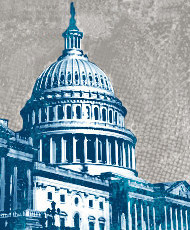
Rep. Peter King (R-N.Y.) is due to hold a hearing Thursday about the “radicalization” of U.S. Muslims and whether they are sufficiently cooperative with U.S. anti-terrorism efforts.
This may be the first of a series on this subject. But holding a hearing based on a flawed radicalization theory that conflates religious practices with preparation for terrorism and focuses exclusively on Muslim-Americans is misguided, discriminatory and counterproductive.
King’s hearings in essence question the Muslim community’s loyalty to the United States. This calls to mind the McCarthy hearings — an unfortunate, and widely condemned, exercise in guilt by association.
The message behind the King hearings also undermines basic First Amendment freedoms. It is unlikely to keep us safe and may well be regretted as a dark moment in our nation’s history.
These hearings stand for the proposition that all Muslims are a threat because of the actions of a few. That is wrong. When a tax protester flies a plane into an Internal Revenue Service building, our government does not then cast an investigatory blanket over all who oppose taxes. When a few religious anti-abortion advocates bomb a women’s health clinic, the FBI does not, and should not, hold hearings about why churches are not more cooperative with law enforcement.
Such actions would rightly be considered ludicrous and discriminatory. Similarly, government must not put the spotlight on the entire U.S. Muslim community.
It is a core American value that we treat our citizens as individuals and do not target them by religion, race or beliefs. Considering an entire community as suspect because of the bad acts of a few is not only unfair; it can lead to greater misunderstanding and discrimination — as history has poignantly shown.
In addition, it can serve to further divide our communities, turning neighbor against neighbor.
King suggests that Muslims’ cooperation in national security efforts must be measured by their willingness to provide information to law enforcement. Americans may share a civic and social commitment to warn law enforcement of a threat, but it is wrong to compel a religious community to prove its loyalty by spying on its members’ views.
Time and again, law enforcement has been successful in preventing terrorist plots over the past few years by using facts and evidence. It does not aid counterterrorism efforts to stigmatize an entire community as “suspect.” It may only undermine the crucial bonds between communities and the government.
Law enforcement officials across the spectrum — including Attorney General Eric Holder and Los Angeles County Sheriff Lee Baca, who will be testifying at the hearing — have lauded the American Muslim community for its role in helping to prevent anti-government and terrorism plots. Many meet regularly with law enforcement and homeland security officials, formally and informally. Muslims in the U.S., and around the world, have clearly and repeatedly denounced extremist violence of all kinds.
Terrorism itself is does not stem from one religion, one ethnicity or one set of beliefs. Recent tragic incidents, including the attack on Rep. Gabrielle Giffords (D-Ariz.) by a gunman in Arizona, show that threats of violence can come from many sources.
Focusing on violent acts and those that conspire to commit them rather than on beliefs shared by thousands of people, who never engage in any illegal or violent activities, would be a more sensible approach in maintaining American values.
Treating all Muslims like suspects is also a waste of law enforcement resources. The most effective means for the government to address security threats is by focusing on real threats of violence or on violent behavior — rather than an ideology.
Congress can and should study terrorism and the threat it poses to our country. Our elected officials have the right to express their views. But official investigations must not trample on Americans’ constitutional rights.
King should be using a fact-based analysis to provide a clearer perspective of the threats facing our country, not belief systems, the expression of dissent or unsubstantiated theories of radicalization.

